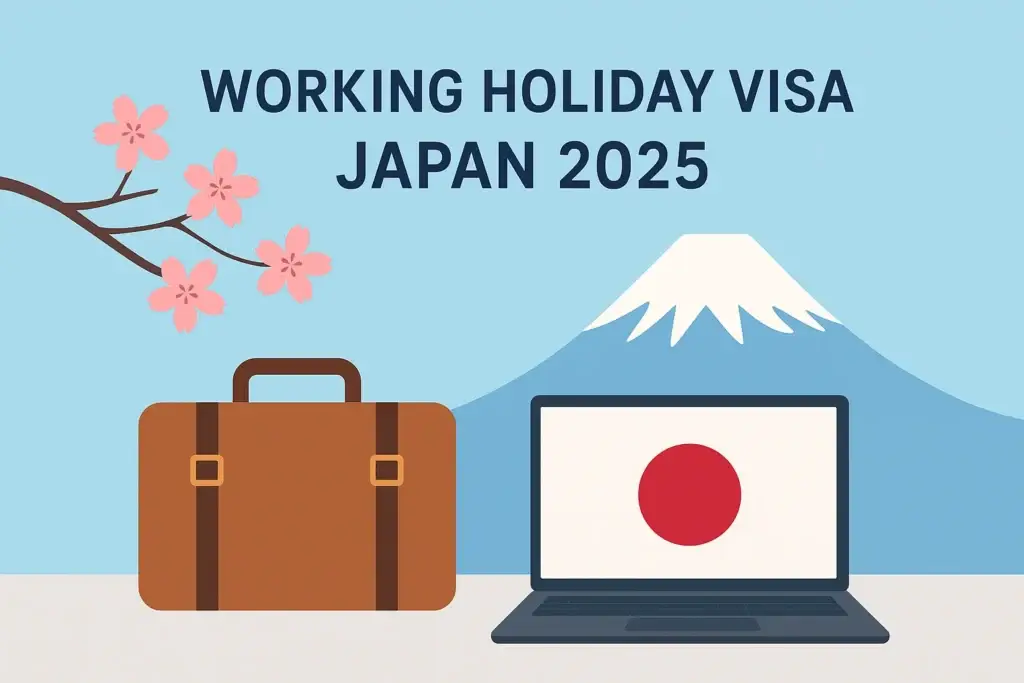🇯🇵 What Is the Working Holiday Visa in Japan?
Japan’s Working Holiday Visa allows young travelers from select countries to live and work in Japan for up to one year.
It’s perfect for those who want to experience Japanese life, improve their language skills, and fund their stay through part-time work.
Unlike student or work visas, this one offers flexibility — you can travel, work, and study at your own pace.
🌍 Which Countries Are Eligible (2025 Update)
As of October 2025, Japan has agreements with 30+ countries, including:
🇦🇺 Australia
🇳🇿 New Zealand
🇨🇦 Canada
🇬🇧 United Kingdom
🇫🇷 France
🇩🇪 Germany
🇸🇪 Sweden
🇳🇴 Norway
🇮🇪 Ireland
🇰🇷 South Korea
🇭🇰 Hong Kong
🇹🇼 Taiwan
Each country’s agreement is slightly different — check your local Japanese embassy for age limits and requirements.
👥 Age & Eligibility Requirements
To qualify for Japan’s Working Holiday Visa in 2025, you must:
- Be a citizen of a partner country
- Be between 18 and 30 years old (for Australia, up to 35)
- Have no dependents or children during your stay
- Hold a valid passport
- Have enough funds for your first month in Japan (usually ¥250,000–¥300,000)
- Have a return ticket or funds to buy one
- Be in good health and of good character
💡 Tip: Show clear proof of savings — Japan is strict on financial stability for visa approval.
📄 Required Documents
When applying at your local Japanese embassy, prepare:
- Valid passport
- Completed visa application form
- ID photo (4.5cm × 4.5cm)
- Resume / CV
- Written itinerary (your travel and work plan)
- Statement of purpose (why you want to join the program)
- Proof of sufficient funds
- Return ticket or financial proof
Processing usually takes 5–10 business days, depending on your country.
💼 What Jobs Can You Do on a Working Holiday Visa?
You can legally work part-time or full-time in most industries, except adult entertainment or jobs “contrary to public morals.”
Also you can check: Japan Digital Nomad Visa: Your 2025 Guide
Popular job types:
- English café or language teaching assistant
- Hospitality (hostels, guesthouses, ryokan)
- Restaurant / café work
- Ski resorts or theme parks (seasonal)
- Farm work (Hokkaido, Nagano, Okinawa)
💡 Many of these jobs offer free accommodation — a great way to save money.
🏠 Cost of Living in Japan (2025 Estimates)
| Expense | Average Monthly Cost (¥) | Notes |
|---|---|---|
| Rent (shared flat) | ¥50,000–¥70,000 | Cheaper in Osaka or Fukuoka |
| Food | ¥30,000–¥45,000 | Cooking saves a lot |
| Transport | ¥10,000–¥15,000 | Regional pass or Suica recommended |
| Health Insurance | ¥2,000–¥4,000 | Required for long-term residents |
| Total Monthly | ¥90,000–¥130,000 | (~$600–$900 USD) |
🧳 Where to Find Jobs
- GaijinPot Jobs – English-friendly listings
- Japan Work Exchange (JWEP) – for working holiday jobs
- HelloWork – Japanese government job center
- Facebook Groups – “Working Holiday Japan” or “Jobs in Japan” communities
- Local guesthouses & farms – Many hire directly via email or LINE
🏞️ Best Cities for Working Holiday Participants
- Tokyo – Most job opportunities, higher cost of living
- Osaka – Friendly locals, cheaper food and housing
- Kyoto – Cultural hub, part-time tourism jobs
- Hokkaido – Ski resort and agriculture work
- Okinawa – Seasonal resort jobs, beach life
📆 Can You Extend the Working Holiday Visa?
Usually, no — it’s a one-time opportunity.
However, some countries (like Australia and France) allow a second visa after returning home and reapplying, depending on embassy agreements.
If you wish to stay longer, you can:
- Enroll in a language school and switch to a Student Visa
- Apply for a Work Visa (if you find a sponsor)
🗣️ My Advice After Living in Japan
A Working Holiday Visa is a life-changing opportunity.
It’s not just about work — it’s about learning the culture, making Japanese friends, and seeing the country from the inside.
If you use your year wisely, you can gain:
- Job experience in Japan
- Intermediate-level Japanese
- Local references for future visa applications
It’s the best “entry point” to long-term life in Japan.
Discover more from Ali in Japan
Subscribe to get the latest posts sent to your email.

